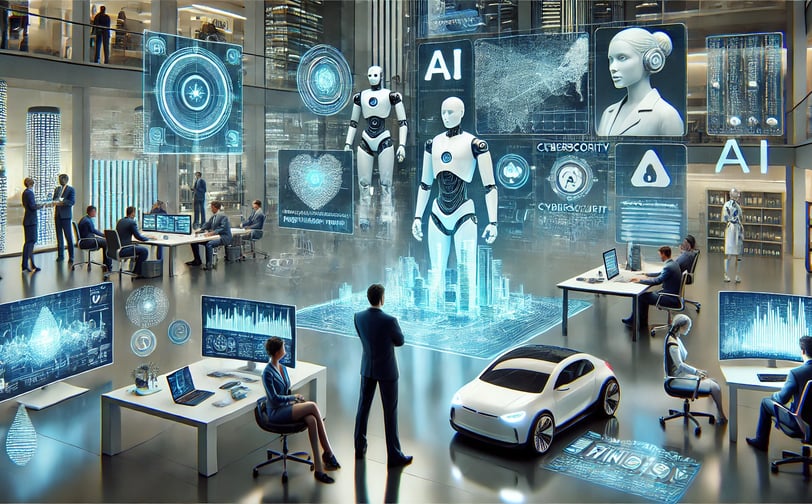AI Agents: Applications, Examples, and Best Practices
Artificial Intelligence (AI) agents are transforming industries by automating tasks, improving decision-making, and enhancing user experiences. With the advent of powerful models like Google's Gemini, AI agents have become even more sophisticated, enabling them to understand and process text, images, and even code more effectively.
2/23/20252 min read


These agents can handle complex problem-solving tasks across various domains, from customer support to scientific research. In this article, we will explore AI agents, their real-world applications, and best practices for deploying them effectively.
What Are AI Agents?
An AI agent is a system that perceives its environment, processes information, and takes actions to achieve a specific goal. These agents can range from simple chatbots to sophisticated autonomous systems.
Types of AI Agents
Reactive Agents – Respond to specific inputs but do not store past interactions (e.g., rule-based chatbots).
Limited Memory Agents – Learn from past interactions to improve responses over time (e.g., recommendation systems).
Theory of Mind Agents – Understand human emotions and intentions (e.g., advanced virtual assistants).
Self-aware Agents – Hypothetical future AI that possesses consciousness and self-reflection.
Real-World Applications of AI Agents
1. Customer Support
AI agents are widely used in customer service to handle queries, reducing response times and operational costs.
Example: Chatbots like Zendesk and Intercom assist customers by answering FAQs and resolving common issues.
Best Practice: Integrate AI with human support to handle complex queries effectively.
2. Healthcare
AI agents assist in diagnostics, treatment recommendations, and patient monitoring.
Example: IBM Watson analyzes medical data to provide personalized treatment options.
Best Practice: Ensure AI models are trained with diverse datasets to improve accuracy and reliability.
3. Finance
AI agents detect fraudulent transactions, optimize trading strategies, and provide financial advice.
Example: Robo-advisors like Wealthfront and Betterment automate investment decisions.
Best Practice: Implement robust security measures to protect user data and prevent financial fraud.
4. Autonomous Vehicles
Self-driving cars use AI agents to navigate, detect obstacles, and make real-time driving decisions.
Example: Tesla’s Autopilot leverages AI to improve road safety and efficiency.
Best Practice: Continuously update AI models to adapt to new traffic patterns and regulations.
5. Content Creation
AI-powered agents generate articles, images, and videos, revolutionizing the media industry.
Example: OpenAI’s GPT models assist in writing blogs and generating creative content.
Best Practice: Maintain human oversight to ensure content quality and originality.
6. Cybersecurity
AI agents detect and prevent cyber threats by analyzing network activity.
Example: Darktrace uses AI to identify and mitigate security threats in real-time.
Best Practice: Regularly update AI models to counter emerging cyber threats.
7. Scientific Research
AI accelerates research by analyzing vast datasets and predicting outcomes.
Example: AlphaFold predicts protein structures, advancing drug discovery.
Best Practice: Collaborate with domain experts to validate AI-generated insights.
Best Practices for Implementing AI Agents
1. Define Clear Objectives
Establish the specific problem the AI agent will solve and its expected outcomes.
2. Ensure Data Quality
Train AI agents using high-quality, diverse datasets to improve accuracy and reduce bias.
3. Integrate with Existing Systems
Seamless integration with current workflows enhances efficiency and user adoption.
4. Monitor Performance
Regularly assess AI agent performance to refine responses and optimize functionality.
5. Maintain Ethical AI Practices
Adopt responsible AI development practices to ensure fairness, transparency, and accountability.
Conclusion
AI agents are transforming industries with their ability to automate processes, analyze data, and interact with users. With models like Gemini, AI capabilities have expanded, making them more adaptable and efficient across various applications.
By understanding their applications and following best practices, businesses can leverage AI to improve efficiency and drive innovation. The future of AI agents is promising, with advancements in machine learning and human-AI collaboration paving the way for more intelligent and autonomous systems. 🚀
Explore
Discover diverse topics in one convenient hub.
Connect
Learn
contact@mindstormblog.com
© 2025. All rights reserved.

